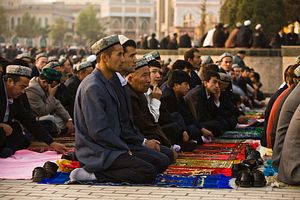Australia is in trouble with China, sort of. On Tuesday night local time, its national broadcaster the Australian Broadcasting Corporation aired a piece about the Uighurs in China by correspondent Stephen McDonell. The Chinese embassy had apparently earlier contacted the network and suggested that Beijing would be unhappy should the half-hour piece be aired.
Speaking with the Sydney Morning Herald, the program’s executive producer Stephen Taylor said Tuesday, “such was their intelligence gathering that they [embassy officials] made overtures to the ABC while the assignment was still under way.”
The documentary aired. It showed the lengths the government went to follow and censor the Australian crew (loitering outside hotel rooms day and night, following in motorcades of cars, and declaring that the reporter couldn’t do interviews after he began a piece-to-camera beside his car).
Speaking via phone from Sydney, Taylor told The Diplomat Wednesday that he had not been privy to the meeting with embassy staff but that given the embassy had implied consequences, “we’re keen to explore what those consequences might be now it’s aired.”
Director of Corporate Affairs, Michael Millett, who took the original meeting, said that officials did not make any specific threats or clarify whether it would be China’s relationship with the broadcaster or more general relations with Australia that might be affected. “The tone of it was they were unhappy and there could be (consequences).” There has, at the time of writing, been no follow up from the embassy in Canberra.
In 2009, Beijing was unhappy about a Uighur film, The Ten Conditions of Love, at the Melbourne International Film Festival. A complaint followed. The Australian government pointed out it could not possibly order the festival directors to pull a film that broke no laws. Cyber attacks on the festival’s website ensued. In 2010, the ABC aired the film and was subject to pressure from the embassy. In both cases it has been the “sensitive” but domestic Uighur issue, although former ABC China correspondent Eric Campbell also noted surveillance and problems during work in Tibet.
Globally, Chinese diplomatic pressure has had success in some areas, most notably on the Tibet and Dalai Lama issue. Whereas once the exiled leader was a feted visitor around the world he is now even denied visas to visit nations such as South Africa or allowed in but not met by officials in Norway. Ten years ago this was not just unlikely – it was almost unthinkable. But diplomatic relations with China are important and foster good economic ties. The cutting of those ties when the Dalai Lama is officially received becomes problematic. That said, it’s not entirely useful to conflate the two areas: nations can refuse visas and politicians can refuse meetings. Giving in to diplomatic pressure to censor news, or private film festivals, is another issue and would not be well-received by the polity.
The last contretemps, if you can even call it that, with China was not so long ago. Palmer United Party founder Senator Clive Palmer tore into China and the government on live, national television, calling them “mongrels” who “shoot their own people” and that they wished to take over Australia and “bring down the wage system” (an uncomfortable echo of the thinking behind the old White Australia policy). His party member Jackie Lambie also suggested China wishes to invade Australia (as does Indonesia and so do proponents of Sharia Law, if more figuratively, according to Lambie). Palmer, a billionaire mining magnate, was in the middle of a dispute with Chinese mining companies at the time.
Though Palmer later apologized and said he had meant no offense to the Chinese people, the Chinese ambassador suggested attacks such as this were “doomed to failure” given the close relationship between the two nations. That close relationship is not one the oft colorful and bellicose Global Times, a popular Chinese tabloid with excitable nationalistic sentiments and an English language edition, exactly treasures, writing, “Australia is a remote business partner, and a place where the Chinese can take a trip and learn some English. These basic understandings should be the starting points for China to re-orientate Sino-Australian relations.” Despite Australia’s relative unimportance, it was still important to discipline Palmer’s “rampant rascality” by imposing sanctions on him and all those with whom he does business, the editorial suggested. “China must let those prancing provocateurs know how much of a price they pay when they deliberately rile us.”
Officially, Australia’s relationship with China has few serious hurdles, though suspicion remains in Australia over the large, somewhat proximate nation and its economic influence. Currently there are worries about Chinese nationals buying up Australian real estate and purportedly pushing up prices. China meanwhile sees U.S. bases and closer ties with Japan as another step in some kind of Western “containment” policy.
Chinese embassy staffers know that Palmer would likely need to apologize for his outburst and they also would have had to have known that despite the great sensitivity surrounding the Uighurs in China, pressuring an independent broadcaster to drop a program was not likely to succeed.
However, procedure is procedure and protocol is protocol it seems – even if provocation is not really provocation – no matter if in the end it simply draws attention to what one wishes to suppress.
Helen Clark was based in Hanoi for six years as a reporter and magazine editor. She has written for two dozen publications including The Diplomat (as Bridget O’Flaherty), Time, The Economist, the Asia Times Online and the Australian Associated Press.

































